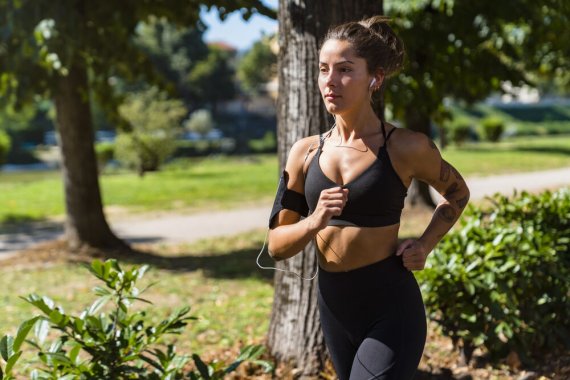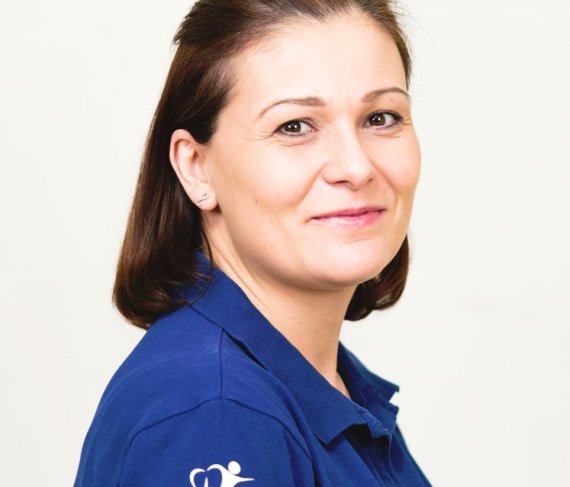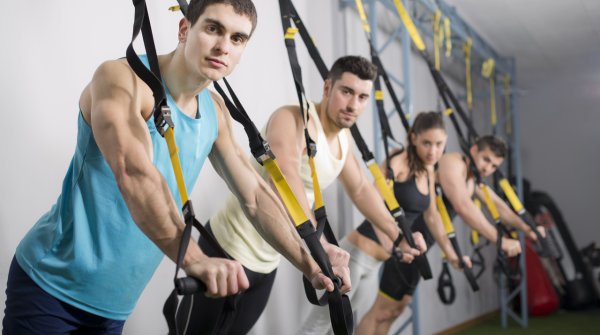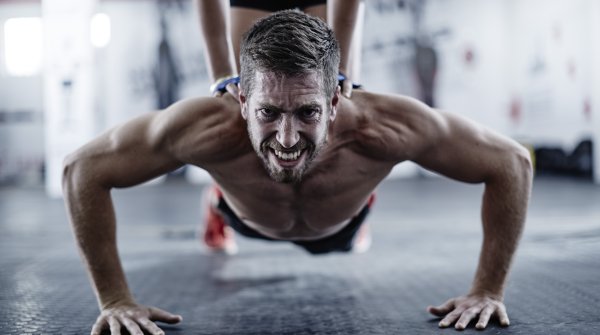
The search engine "Google" offers over 4.9 million results to the question: "How many calories do I burn while exercising?". The calculations, like the results, are sometimes very different.
Dr. Hande Hofmann is a research associate at the Technical University of Munich (TUM). Her areas of expertise at the Faculty of Sport and Health Sciences, are nutrition and health, sport and the immune system, and nutritional supplements and sport. She clarifies the measurement possibilities in calorie consumption.
Change the diet and do a lot of exercise - these are the principles of any diet. In 2021, people are better informed about high-quality food and know which sports really help with weight loss.
Tracking consumption is more challenging, because if you want to lose weight, you need to achieve a calorie deficit. To keep track of this deficit, the calories burned during exercise must be measured. The poor measurability is often the reason why so many people do not see any progress - no wonder, because if you do not have an overview of your consumption, you also do not know how much you can eat per day.
The following interview with expert Dr. Hande Hofmann gives answers to important questions about the intensity of sports, measurability of calorie consumption and what should generally be considered when losing weight.
ISPO.com: Dr. Hofmann, is there a rule that I can use to calculate my calorie consumption for a particular sport?
Hande Hofmann: Yes, there is a rule, but in the first step before the calculation, we follow an old rule that says: How well can I entertain myself when I'm doing a sport? Let's take hiking as an example: If I can chat normally during the hike and I'm not really sweating, then we're talking about the lower moderate exertion here.
If I notice that I have to concentrate on walking and the pace is above my normal intensity, so that I have to take a break from conversation every now and then and I start to sweat, then I am in the moderate range, i.e. in my comfort zone. It's already exhausting, but I don't have to exhaust myself yet. And if I then increase the pace even more, so that conversation is no longer possible, then I am in an intense strain.

Can you categorize that?
You can divide the load into three categories, and then it depends on what I personally want to achieve:
- Category 1 "lower moderate impact": enjoy nature, the calories don't matter.
- Category 2 "moderate load": this includes light sports. In this category, my body already burns more calories than in everyday exercise.
- Category 3 "intensive load": In this category training effects are achieved. The aim is to increase one's fitness and load capacity. In order to achieve this, you have to set a stimulus in the body and challenge it, i.e. go into intensive stress.
In the intensive load I do not only do sport, but I train. In other words, I set a stimulus that goes beyond my personal norm and that I don't always have, which is why the body has to adapt. With this I achieve effects. In the long run, I lose weight and build more muscle mass. There are different approaches here, because it all depends on what you personally want to achieve.
Once I have set the categories, how can I calculate my personal calorie consumption?
Let's play this out for jogging: I jogged for an hour, I assign the intensity to the medium category, meaning feel-good range. Then I can assume 1 kilocalorie per kilogram of body weight per hour. That would mean 600 kilocalories for a 60 kilogram person.
If you jog in the first category, i.e. lower moderate load, then you can assume 0.7 to 0.8 kilocalories per kilogram of body weight per hour. In the intensive load/category 3, the factor is between 1.2 and 1.4.
A very honest calculation ...
Absolutely. This categorization helps very well to sharpen your own perception. If I arrive back home with a few beads of sweat on my forehead after 30 minutes of jogging, I haven't burned 600 calories and therefore haven't eaten a full meal.
With 30 minutes of jogging I have consumed about 250 calories as a woman. Then you have to say honestly: It was nice, I have moved, but I have not burned much.
Now I have a good formula to add calories to my sports units, but when it comes to eating, it gets difficult again. How can I help myself here?
For example, there are great apps for this that can help you calculate calories. Then I can estimate whether I'm going out with a minus, a plus, or in balance. When the calorie consumption is balanced, you have to realize that you are not losing weight.
And this is where apps can actually help?
Yes, I think so. Especially for people who have no idea what 100 or 200 calories are, for example, these apps are ideal. I've also noticed this in my work with our students, who get to grips with the apps so intensively and almost playfully that they get a feel for their content relatively quickly.
It's not about having to be accompanied by an app for a year or having to monitor everything with the help of an app. From my point of view, apps should be seen more as a learning tool.
Can you recommend one app in particular?
I don't want to single one out, everyone can filter out the right one for themselves. In addition to apps, there are now other good gadgets that track movement, for example, or fitness wristbands and smartwatches.
Here you can then have your average speed measured. These digital solutions then calculate calories burned based on body weight, gender and age. This works well. Of course, the results can vary from app to app, but the differences are marginal.
To wrap up the interview, we answered the most common questions related to calorie tracking.
You need a calorie deficit of 7,000 calories to lose one kilogram.
The most popular and one of the best fitness apps on the market is MyFitnessPal.
Smartwatches provide information about how many calories you burn while exercising. The most popular models include the Wear OS 3, Galaxy Watch 4 and the Xiaomi Mi Watch.
If you want to lose weight, you have to expect a calorie deficit of 300 to 500 calories. Ideally, you start smaller at first and build up the deficit.
There are more and more ways to measure your own calorie consumption and make your diet more efficient. Apps and smartwatches offer probably the best assistance, although here too caution is advised - only a few providers perform convincingly in tests and can guarantee an accurate measurement.
The key to success in dieting remains constant progress. Those who exercise regularly and pay attention to a healthy diet will see long-term success. After all, the goal should not be a temporary diet, but the turnaround to a constant healthy lifestyle with lots of exercise and high-quality food.
 Know-HowThe 11 Best TRX Exercises
Know-HowThe 11 Best TRX Exercises
- ISPO awards
- Mountain sports
- Bike
- Design
- Retail
- Fitness
- Health
- ISPO Job Market
- ISPO Munich
- ISPO Shanghai
- Running
- Brands
- Sustainability
- Olympia
- OutDoor
- Promotion
- Sports Business
- ISPO Textrends
- Triathlon
- Water sports
- Winter sports
- eSports
- SportsTech
- OutDoor by ISPO
- Heroes
- Transformation
- Sport Fashion
- Urban Culture
- Challenges of a CEO
- Trade fairs
- Sports
- Find the Balance
- Product reviews
- Newsletter Exclusive Area
- Magazine
